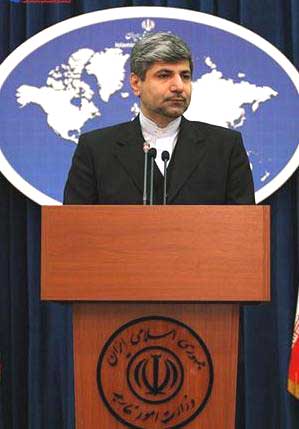|
Iranian Foreign Ministry Spokesman Ramin Mehman-Parast said that the US dual-track policy of pressure and talks towards Iran will yield no result, and called on the US officials to avoid contradictory attitudes and measures. |
 Recalling imposition of anti-Iran sanctions, removing the name of the terrorist Mojahedin-e Khalq Organization (MKO, also known as MEK, NCR and PMOI) from the terrorists list and arresting some Iranian nationals by the US officials, Mehman-Parast reiterated that such contradictions will not bring favorable outcome during bilateral talks.
Recalling imposition of anti-Iran sanctions, removing the name of the terrorist Mojahedin-e Khalq Organization (MKO, also known as MEK, NCR and PMOI) from the terrorists list and arresting some Iranian nationals by the US officials, Mehman-Parast reiterated that such contradictions will not bring favorable outcome during bilateral talks.
He reiterated that they (the Americans) have come to the conclusion to negotiate with Iran but they should know that talks along with pressures and sanctions will be meaningless.
The diplomat advised the US officials to hold talks on the basis of mutual respect, stressing that Tehran is ready for serious talks on certain issues.
Mehman-Parast made the remarks in a joint meeting held between the three ministries of foreign affairs, interior and defense, commenting on Washington's readiness to hold direct talks with the Islamic Republic of Iran.
On Tuesday, Iranian Foreign Minister Ali Akbar Salehi slammed the United States' dual-track approach towards Iran in the last several years, and said the policy has resulted in Tehran's lack of trust in the US officials' offer of direct talks with Iran.
"If US officials are serious about their readiness to hold talks, they should know that pressure and threats are not consistent with an invitation to talks," Salehi said in a meeting with a group of scholars, political analysts, foreign ambassadors and diplomats in Germany on Tuesday.
Answering a question about US Vice President Joe Biden's recent offer of direct talks with Iran, Salehi said Washington should stop issuing threats and mounting pressure if it is serious about entering negotiations with Tehran.
On Saturday, Iran showed a response to a US offer of direct talks to resolve the stalemate over Tehran's nuclear program.
"This negotiation can only take place when we get enough assurances that, this time, the US comes forward with honest intentions. Because our previous experiences unfortunately have shown the opposite," the Iranian foreign minister told euronews.
Iran's President Mahmoud Ahmadinejad expressed today the hope that Washington's foreign policy towards Iran would witness practical changes to persuade Tehran to agree with the US proposal for direct talks.
Iran evaluates the new proposal "positive", Ahmadinejad said, adding if the US changes its behavior, Iran will consider the proposal.
He made the remark in a meeting with Egyptian media persons.
The Iranian President arrived in Egypt earlier today to participate in a summit meeting of the Organization of Islamic Cooperation (OIC) and attend talks with senior Egyptian officials on bilateral relations and cooperation.
Addressing the Munich Security Conference, Biden said the Obama administration is prepared to hold direct negotiations with Iran to end the stand-off over its nuclear program if the Iranian leadership takes them seriously.
"There is still time for diplomacy, but it has to be successful. The ball is now in Iran's court," Biden said.
The United States and Iran broke diplomatic relations in April 1980, after Iranian students seized the United States' espionage center at its embassy in Tehran. The two countries have had tense relations ever since, but have shown willingness to attend talks to help resolve regional issues, including security in Iraq. Yet, the two countries have avoided talks on bilateral issues for the last thirty years.
Washington and its Western allies accuse Iran of trying to develop nuclear weapons under the cover of a civilian nuclear program, while they have never presented any corroborative evidence to substantiate their allegations. Iran denies the charges and insists that its nuclear program is for peaceful purposes only.
